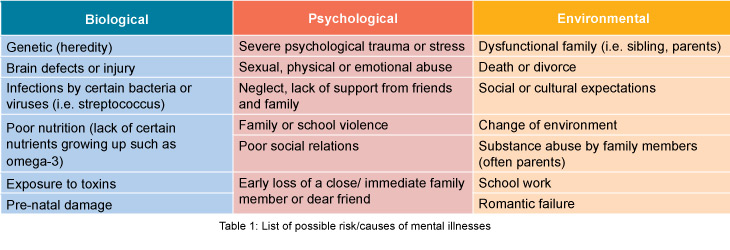What Is Mental Health?
To understand mental illness we must know what mental health is. The World Health Organization defines mental health as being able to realize one’s own potential, being able to cope with normal stresses of life, can work productively and contribute beneficially to the community.
Teenagers are happier in their families, more socially sound, are able to learn better, do better at school, and enjoy new experiences if they’re mentally healthy and capable. It is during these fragile early few years of adolescence that mental health is fostered and patterns are set as they later transition into adulthood.
Is It Prevalent?
Mental illnesses are emerging as serious health threats in both developed and developing nations. The National Health and Morbidity Survey (2011) showed that approximately 1 million (20%) children between the ages of 5 and below 16 suffer from mental health problems such as developmental disability, emotional and behavioural disorders.
Being Mentally Ill
Mental disorders are a group of illnesses that can affect your child psychologically. It can impede their ability to focus, get along with other people, do basic tasks – or just enjoy life in general.
Types of mental disorders/illnesses:
- Anxiety Disorder – Post-Traumatic Stress Disorder (PTSD), Obsessive Compulsive Disorder (OCD)
- Mood Disorder – Clinical depression and bipolar disorder
- Psychotic Disorder – Schizophrenia
- Eating Disorder – Bulimia and anorexia nervosa
- Developmental disorder – Attention Deficit/Hyperactivity Disorder (ADHD)
- Behavioural disorder – Oppositional Defiant Disorder (ODD)
- Intellectual disability – Autism Spectrum Disorders (ASD)

Signs Of Mental Illness
Most teenagers experiencing mental illness observe sudden changes in their habits or behaviour. Changes can be abrupt or progress as time passes, symptoms may include:
- Recent social withdrawal and loss of interest in others.
- An unusual drop in functioning, especially at school or work, such as quitting sports, failing in school, or difficulty performing familiar tasks.
- Problems with concentration, memory, or logical thought and speech that is hard to explain.
- Loss of initiative or desire to participate in any activity; apathy.
- A vague feeling of being disconnected from oneself or one’s surroundings.
- Loss of self esteem.
- Fear or suspiciousness of others or a strong nervous feeling.
- Uncharacteristic, peculiar behaviour.
- Dramatic sleep and appetite changes or deterioration in personal hygiene.
- Rapid or dramatic shifts in feelings or “mood swings.”
- Weight loss and loss of appetite.
These symptoms do not conclusively suggest presence of mental disorder. But they are strong indicators for you to pursue expert diagnosis from a paediatrician, psychologist or psychiatrist.

Causes Of Mental Illness In Teens
Although the exact cause of most mental illnesses is unknown and may vary from one child to another, research elucidates that many of these conditions may be caused by interaction of biological, psychological, and/or environmental factors.







Comments